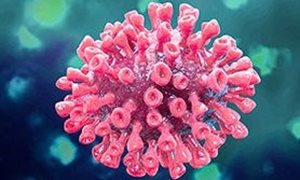26 March 2020
“We have seen in China that there is a demonstrable link between the availability of medical supplies and equipment and the mortality rate related to COVID-19: lower availability of medical resources in a country is associated with a higher mortality rate. This problem can be prevented by adhering to WHO infection prevention (IPC) standards. This concerns measures such as the timely implementation of quarantine/isolation and social distancing. It is also important to have sufficient stocks of medical devices such as respirators, and to provide protective equipment such as face masks to healthcare staff and patients. ”
“Certainly in low-income and middle-income countries, programs still need to be established to meet minimum IPC standards. The virus currently appears to be spreading mainly in the Northern Hemisphere, where it is winter. This suggests that the virus could also spread rapidly in the Southern Hemisphere when it is winter there. The low prevalence of SARS-CoV in Africa and South America in 2003 supports this hypothesis, but it has not been rigorously tested. In any case, the countries in the Southern Hemisphere now have the opportunity to prepare for a possible outbreak of COVID-19.”
Refugee camps
“The need for preventive measures is particularly high in refugee camps, many of which are located in countries with limited medical resources. Healthcare in these camps is lacking, and access is limited. Moreover, there is less monitoring of vulnerable people with conditions such as cardiovascular disease, diabetes, chronic respiratory diseases, high blood pressure and cancer. These groups are especially susceptible to COVID-19, which means that an outbreak could have disastrous consequences in these camps. ”
“A major outbreak of COVID-19 in low and middle-income countries can still be prevented if they comply with the minimum IPC standards of the WHO. In addition, good cooperation between governments and media is crucial. Accurate, concise and motivational messaging is crucial for supporting measures and legislation to prevent the spread of COVID-19.”
Publication
Managing COVID-19 in Low- and Middle-Income Countries
Joost Hopman, MD, PhD, DTMH; Benedetta Allegranzi, MD, DTMH; Shaheen Mehtar, MBBS, MD (Lon).
JAMA: Published online March 16, 2020. doi:10.1001/jama.2020.4169

“We have seen in China that there is a demonstrable link between the availability of medical supplies and equipment and the mortality rate related to COVID-19: lower availability of medical resources in a country is associated with a higher mortality rate. This problem can be prevented by adhering to WHO infection prevention (IPC) standards. This concerns measures such as the timely implementation of quarantine/isolation and social distancing. It is also important to have sufficient stocks of medical devices such as respirators, and to provide protective equipment such as face masks to healthcare staff and patients. ”
“Certainly in low-income and middle-income countries, programs still need to be established to meet minimum IPC standards. The virus currently appears to be spreading mainly in the Northern Hemisphere, where it is winter. This suggests that the virus could also spread rapidly in the Southern Hemisphere when it is winter there. The low prevalence of SARS-CoV in Africa and South America in 2003 supports this hypothesis, but it has not been rigorously tested. In any case, the countries in the Southern Hemisphere now have the opportunity to prepare for a possible outbreak of COVID-19.”
Refugee camps
“The need for preventive measures is particularly high in refugee camps, many of which are located in countries with limited medical resources. Healthcare in these camps is lacking, and access is limited. Moreover, there is less monitoring of vulnerable people with conditions such as cardiovascular disease, diabetes, chronic respiratory diseases, high blood pressure and cancer. These groups are especially susceptible to COVID-19, which means that an outbreak could have disastrous consequences in these camps. ”
“A major outbreak of COVID-19 in low and middle-income countries can still be prevented if they comply with the minimum IPC standards of the WHO. In addition, good cooperation between governments and media is crucial. Accurate, concise and motivational messaging is crucial for supporting measures and legislation to prevent the spread of COVID-19.”
Publication
Managing COVID-19 in Low- and Middle-Income Countries
Joost Hopman, MD, PhD, DTMH; Benedetta Allegranzi, MD, DTMH; Shaheen Mehtar, MBBS, MD (Lon).
JAMA: Published online March 16, 2020. doi:10.1001/jama.2020.4169
Related news items

Chronic malaria infections produce more and more infectious gametocytes
28 April 2021 In a recent article in Nature Communications, researchers from the department of Medical Microbiology uncovered intriguing dynamics in the production of the transmission stages of malaria parasites, gametocytes. go to page
Invasive fungal infections in influenza and COVID-19
8 July 2020 The Aspergillus fungus is found in the lungs of many COVID patients. A parallel occurs with influenza patients, who often develop a serious fungal infection. Although such a serious fungal infection seems to occur less frequently in COVID-patients, alertness remains necessary, go to page
Early symptoms in Radboudumc healthcare workers who were tested for SARS-CoV-2
12 May 2020 In Eurosurveillance RIHS researcher Alma Tostmann and colleagues from the Radboudumc COVID-19 Team describe that general symptoms like fever, headache, general malaise and muscle ache were associated with a positive SARS-CoV-2 test. Respiratory symptoms however, were not predictive for SARS-CoV-2. go to page
ERC Consolidator Grant for Bousema and Sechopoulos
12 December 2019 Teun Bousema and Ioannis Sechopoulos each receive an ERC Consolidator Grant of around two million euros. This European research subsidy will enable them to carry out research for the next five years. go to page
Two RIHS researchers in top 1 percent by citations
28 November 2019 Bart-Jan Kullberg and Jacques Meis, made it to this year’s list of highly cited researchers. Researchers in this list are selected for their exceptional research performance and are regarded to have had a major impact on fellow scientists. go to page